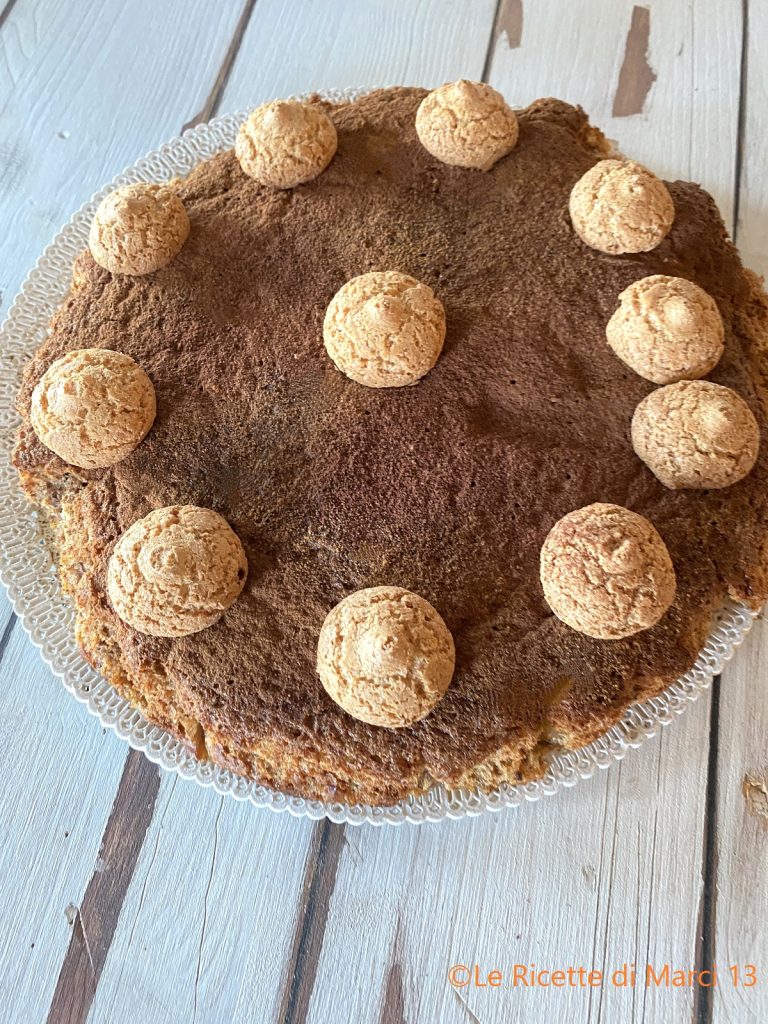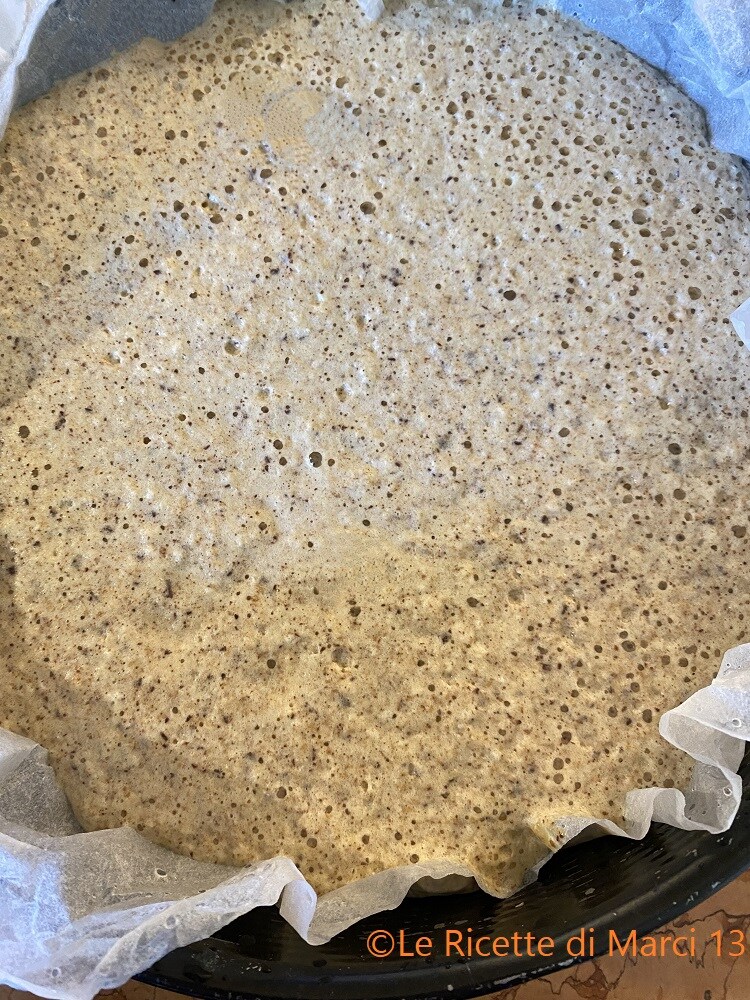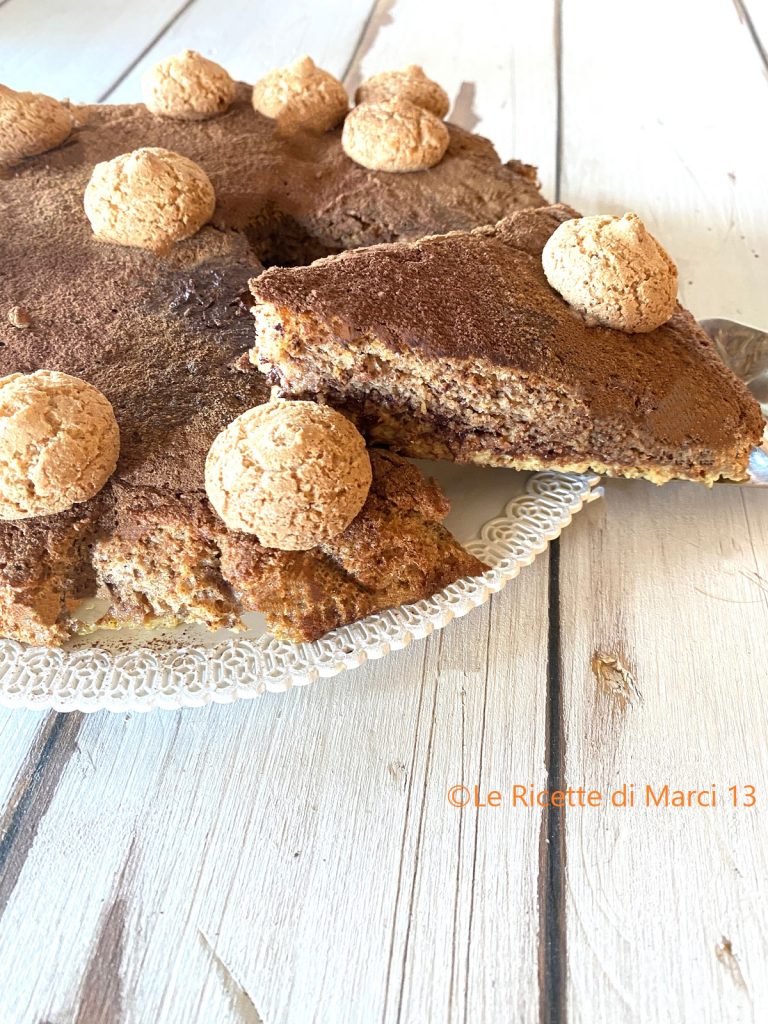Crescionda Spoletina with Amaretti and Chocolate, a very ancient Umbrian dessert, which is prepared during Carnival.
The traditional family recipe is from my maternal grandmother who was born in Spoleto, but every family has their own secret recipe.
The Crescionda of Spoleto is a delicious dessert with different textures, reminiscent of the magic cake: because once baked, when cut, you will magically see three different layers composed of amaretti, cream, and dark chocolate.
A simple and easy chocolate cake to make and impressive, that will conquer you at first bite, it is so soft it is like a pudding, melting in the mouth.
The Crescionda improves if consumed the next day, to allow the flavors to blend better and it keeps for several days at room temperature.
If you’re looking for (sweet or savory) recipes for Carnival, click on my: “Carnival Special“
You might also be interested in:

- Difficulty: Very Easy
- Cost: Cheap
- Preparation time: 15 Minutes
- Portions: 6 people
- Cooking methods: Oven
- Cuisine: Regional Italian
- Region: Umbria
- Seasonality: Carnival, Winter
- Energy 464.45 (Kcal)
- Carbohydrates 67.68 (g) of which sugars 35.27 (g)
- Proteins 9.86 (g)
- Fat 16.67 (g) of which saturated 7.97 (g)of which unsaturated 7.85 (g)
- Fibers 2.23 (g)
- Sodium 291.33 (mg)
Indicative values for a portion of 80 g processed in an automated way starting from the nutritional information available on the CREA* and FoodData Central** databases. It is not food and / or nutritional advice.
* CREATES Food and Nutrition Research Center: https://www.crea.gov.it/alimenti-e-nutrizione https://www.alimentinutrizione.it ** U.S. Department of Agriculture, Agricultural Research Service. FoodData Central, 2019. https://fdc.nal.usda.gov
Ingredients for the Crescionda Spoletina with Amaretti and Chocolate
- 4 eggs
- 7 oz oz amaretti (dry)
- 3.5 oz oz 55% dark chocolate (high quality)
- 2 cups cups whole milk
- 1/2 cup cups all-purpose flour (sifted)
- 1/3 cup cups granulated sugar
- 4 tsp tsp amaretto (liqueur)
- 1 tsp tsp vanilla extract
- 1/4 tsp tsp fine salt
- 1/2 tsp tsp ground cinnamon (optional)
Tools
- Bowl
- Cutting Board with cutter
- Knife
- Beater electric
- Mixer
Steps for the Crescionda Spoletina with Amaretti and Chocolate
First, chop the amaretti with a mixer and set them aside. Also chop the dark chocolate with a knife.
With the help of an electric beater, beat the 4 egg yolks with the sugar for about 8 minutes, until the mixture is light and frothy. In another bowl, beat the egg whites until stiff peaks form.

Add to the beaten egg yolk mixture the finely chopped chocolate with the knife, the milk, salt, vanilla extract, cinnamon (optional) and blend all the ingredients well, then add the sifted flour and the chopped amaretti.
Mix well all the ingredients and finally gently fold in the beaten egg whites, mixing delicately from bottom to top.

Generously butter and flour a springform pan about 9 inches in diameter, bake in a preheated oven at 350°F for about 50 minutes.

Unmold the crescionda and let it cool completely, garnish with a few whole amaretti. Enjoy it cold, better the next day.
Shopping Tips!!!
I prepared the batter quickly and without lumps, with this electric beater which has a powerful 500 W motor and 9 accessories. #adv
To chop the amaretti, I used the handy mini-chopper accessory of my Braun MultiQuick 9 1200 W power and 5 accessories, which you can buy at a special price on Amazon. #adv
Read my review for GialloZafferano on the Minipimer “Braun MQ9045 MultiQuick 9“
Read my review for GialloZafferano on the Minipimer “Braun MQ9045 MultiQuick 9“
FAQ (Questions and Answers)
Crescionda: Origins and History
The Crescionda is an Umbrian dessert (particularly from Spoleto) typical of Carnival. The name Crescionda comes from “crescia unta”, meaning “oly focaccia”- for its soft consistency and shiny appearance – although it seems that oil was never used in its preparation.
It appears that Crescionda’s ancient roots reach back to the Middle Ages. An ancient version, in addition to chocolate, even included the use of chicken broth, breadcrumbs, and pecorino cheese. A sweet and sour flavor that over the centuries has evolved considerably along with the more modern idea of dessert.

